Iranian students express lack of support amid women-led revolution
Mahsa Amini, age 22, was arrested and murdered by Iranian morality police.
Demands for “Jin, Jiyan, Azadi,” and “Zan Zendegi, Azadi” are voiced all through Iran, but the call for “Woman, Life, Freedom” at Iowa State remains unsupported. After multiple demonstrations, varied levels of support, and student demands for solidarity, Wendy Wintersteen, Iowa State University President, has remained silent.
The death of Jina (Mahsa) Amini, a 22-year-old Kurdish woman, while in the custody of “morality police” for improper head-covering, served as a catalyst for an uprising against the regime of the Islamic Republic led by Iranian women. The regime has met civil demonstrations with brutality and repression, including the killing of hundreds, internet blackouts, mass arrests, brutal attacks at prominent universities and more.
For students born and raised in Iran, being in America has filled them with a range of emotions.
“There is nothing I can do to stop my tears and the feeling of helplessness and loss that I feel; loss of land and freedom, loss of belonging,” said a graduate student who wishes to go by Mahsa Amini for security reasons and to be Mahsa Amini’s voice. “ I am envious of the brave people of Iran, especially our women, the millennials and Generation Z.”
Being cut off from communication with family has been a common experience, as Kim and Sam, graduate students in the chemical and biological engineering departments who wish to go by nicknames for security reasons, shared. They explained that what is happening in Iran is always at the forefront of their minds.
Sam, who attended Sharif University, where brutal attacks on students and faculty are occurring, said she has had multiple emotional breakdowns but remains hopeful for the outcome of the protests.
“If the protests make the change that we are hoping for, which is the change of the whole regime, then that is the single most important thing that will happen in our lifetimes,” Sam said.
Kim expressed guilt for not being able to join the protests and having safety and the ability to stay behind a Twitter screen.
“The number of times, just when I’m at home, I open my laptop and check tickets to see what it would cost for me to go back home and just, like, because this is more than history,” Kim said.
While numerous uprisings have occurred since the revolution and installment of the Islamic Republic, this one is different. This is the first revolution that started for women’s rights and is led by women at the forefront, Sam said.
“Women in Iran are caught in a system of gender apartheid through legal mandates that relegates them to a subordinate status, depriving them of their basic rights,” Mahsa Amini said. “But, these resilient and courageous women refuse to be held back and continue to make strides despite the barriers.”
Saba Amiri, a sophomore in women’s and gender studies, said because of the situation in Iran, their grandmother and aunt are unable to come to America for Thanksgiving as planned, even though they hold citizenship and a green card.
“They cut off the internet, so we can’t send them their tickets,” Amiri said. “Everything’s inflated, so they can’t buy any.”
Being born in America and only visiting Iran a few times, Amiri’s experience involved watching her parents worry.
Amiri, who is also hopeful about the outcome of the revolution, said elders always thought they would get the chance to go back to Iran after a revolution, and now there might be a chance.
“Now, there actually is a revolution happening,” Amiri said. “Are they going to stay, are they going to leave? It is so weird to think that they’re actually getting what they want.”
For all of these students, the end goal of the revolution remains the same: the end of the regime of the Islamic Republic.
Response at Iowa State
After holding two demonstrations on campus: a memorial for Mahsa Amini Sept. 21 and a protest on Sept. 29, Sam shares confusion at the lack of response from Iowa State officials.

“We should be on Iowa State’s radar by now,” Sam said. “It would have been nice to have my existence acknowledged, and we have a big Iranian population.”
Kim questioned if the university board had restrictions on discussing political issues or voicing and publishing opinions.
This is not the case; however, as Sam points out, President Wendy Wintersteen’s response to the events in Ukraine last year came quicker and was more vocal with a news release.
“The war in Ukraine is a senseless and unprovoked tragedy that has already impacted the lives of millions of people,” Wintersteen stated in the release. “Our thoughts are with the Ukrainian people and with their loved ones in places like Ames.”
After contacting the Office of the President regarding their silence, the message was forwarded to the Division of Student Affairs, who were asked to respond.
“Student Affairs leadership has been in communication with members of the Iranian Students and Scholars Association,” said Katy Cran, strategic communications adviser for the Office of the Senior Vice President for Student Affairs. “University leaders feel this is a more effective and personal approach, rather than a campuswide statement, in that it offers the opportunity to hear directly from students who are the most deeply impacted.”
Kim shared appreciation for the response but said the Iranian community on campus has not been able to get a direct response from the president or the Office of the President.
“We would have liked a more broad acknowledgment of the fact and for the university to take a clear stance on this, especially after the brutal attack on students of Sharif University, whose students form a good percentage of students at both ISU and in the U.S.,” Kim said. “All Iranian students want to know that the university has heard their voices and is standing with them in solidarity, just like they did with the invasion of Ukraine.”
The lack of broad acknowledgment of the atrocities in Iran has translated into the mixed responses Iranian students have received.
Mahsa Amini shared receiving positive responses from wearing a t-shirt with the slogan “Women, Life, Freedom” and explained this as a moment of becoming visible and having an opportunity to talk about Iran and the strength of Iranian women.
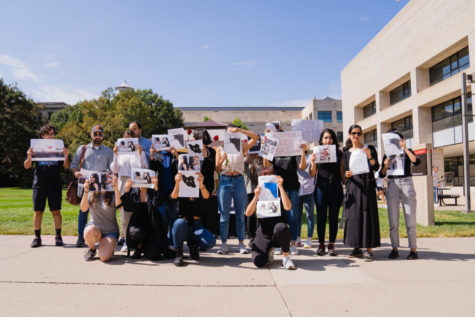
Amiri, who had friends and classes discussing the events in Iran, caveats this by saying that outside her courses in women’s and gender studies, there has been relative silence.
Kim and Sam, as graduate students, experienced a few words of support from advisors, but only after sending extensive emails about their current situation or demonstrations they organized.
Important qualifying exams and the stress of what is happening in Iran created a lot of pressure for Sam and led her to reach out to her advisor.
“I don’t know if she really understood the gravity of the situation, but her response was better than nothing,” Sam said.”It would have meant a little bit to me if she said ‘okay, maybe after your qualifier, maybe take a day off.’”
These responses vary, with some students receiving more sympathetic responses than others.
“I would have liked to see a little bit more support from our department head and just like, you know, educate the faculty, talk about them, inform them of what this is, why it is happening, how it can affect your student employees,” Kim said.
Kim said creating a uniform response would require the university and Wintersteen to direct departments on how to address the situation in Iran and their Iranian students.
“When you are in a position of power, you have certain responsibilities, and if you want to be a good leader, an honest and likable leader, you should connect with your people and the people who work around you on an emotional level,” Kim explained.
“A lesson for America”
Ideologies such as “we do not follow politics” or “we are not political people,” Kim said, cause people to close their eyes to the stripping of rights and subtle changes that occur every day.
Kim said taking time to read about the circumstances individuals around the world find themselves in, such as the current events in and history of Iran, can help people better understand their rights and how easily they can be taken away if one is not aware.

“We were a free country, women were free and had rights, we had a somewhat unproblematic government, a strong passport, very good international presence and a very safe country,” Kim said. “It slowly started after the revolution; they slowly started taking our rights away one by one.”
The revolution ushered in the removal of rights enforced through the killing of free thought, critical individuals, and those who translated or wrote good books, including governmental rulers (mullahs and ayatollahs) who offered any sort of disagreement.
The regime not only infringes on women’s rights but also the rights of members of the various religious groups in Iran, such as Christians, Jews, Baháʼís, Zoroastrians and more.
“What I think might make people in America pay attention is saying these other religions also exist, and being Christian doesn’t exempt you from conforming to the forced hijab laws,” Sam said. “You still have to comply.”
The lesson here is that the removal of rights can happen anywhere, America included. Kim and Amiri both draw comparisons to Roe v. Wade and the political climate currently plaguing America as an example.
“This was way back for us,” Kim said. “Taking away women’s right to choose what she wants to do with her body started when Islam was pronounced as the only and official religion of the country, and we went into an Islamic Republic, basically a government based on Islam.”
This is starting to happen in America, and Kim warns that if women do not fight for their rights now, they will have to pay a lot more later on to get them back, similar to what is happening in Iran.
“Tearing down a building is super easy, building it back up is not that easy, so I just hope that the rest of the world sees this and learns this single, particular, very important lesson,” Kim said. “It’s truly this circle and fascinating that we are seeing this happen all across the world.”
How to Help
Unlike other crises happening globally, the first step does not involve fundraising or donations, Kim explains.
“We couldn’t even use the money since what we are talking about is taking the regime down,” Sam added.
Monetary help does not change the nature of the lives of those living in Iran, Kim and Sam said.

(Iranian Students’ and Scholars’ Association)
“The only thing that changes [our lives] is if people are informed, know this is happening and care about it,” Kim said. “ That’s the only way, and I guess that is more expensive than taking 10 bucks out of your wallet and calling it a day.”
Caring about issues happening in the Middle East is a good way to help, along with seeing the privilege that comes with living in America, Amiri said.
“One message to give to Iowa State students is don’t undermine your education; it’s a privilege that can be taken away from you,” Amiri said.
Amiri also stressed the importance of separating Islam from the situation in Iran in an attempt to avoid Islamophobic rhetoric from spreading, and the goal is not to have American intervention.
“If America does come and help, America’s not going to just leave us alone, they’re going to take advantage and take over,” Amiri said. “I was like, ‘oh no, it’s gonna be like what happened in Afghanistan.’”
Mahsa Amini shared that support can be shown in many ways and suggests signing Amnesty International’s petition to end Iran’s ongoing impunity, attending demonstrations, sharing and following informative social media accounts and asking representatives to voice support for Iranian protests.
A human chain will form at 11 a.m. Saturday outside of Parks Library to show support for the revolution occurring in Iran, according to the Iranian Students’ and Scholars’ Association.
“We want this regime gone,” Kim said. “ Don’t change the story, don’t bend it, don’t break it. Just be our voice, that is all we want.”
Your donation will support the student journalists of the Iowa State Daily. Your contribution will allow us to purchase equipment, send our student journalists to conferences and off-set their cost of living so they can continue to do best-in-the-nation work at the Iowa State Daily.


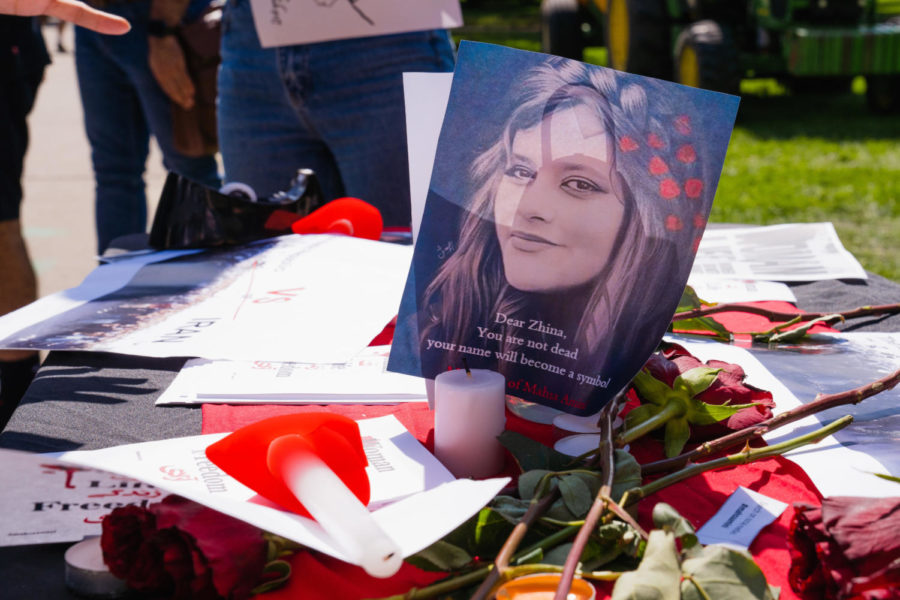



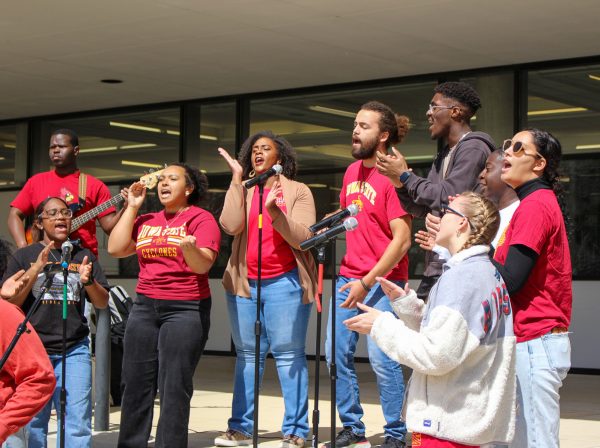

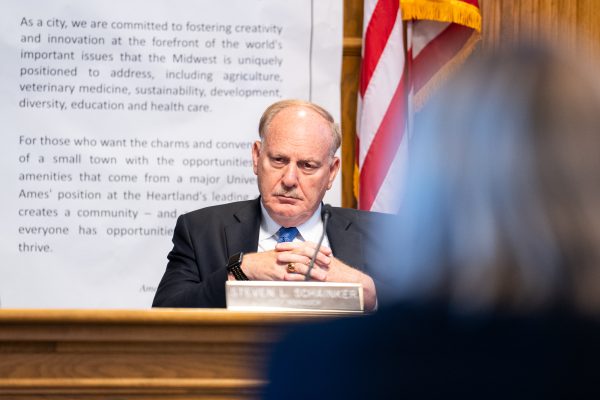

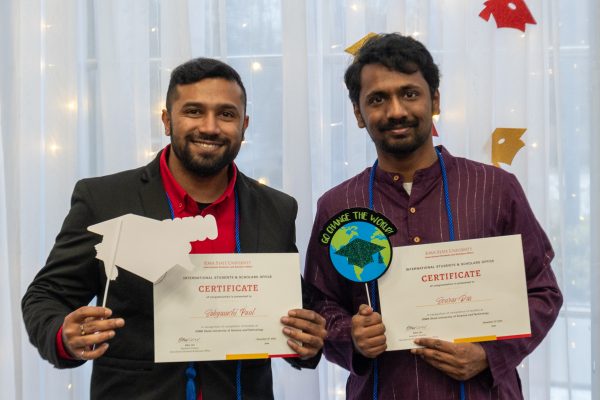
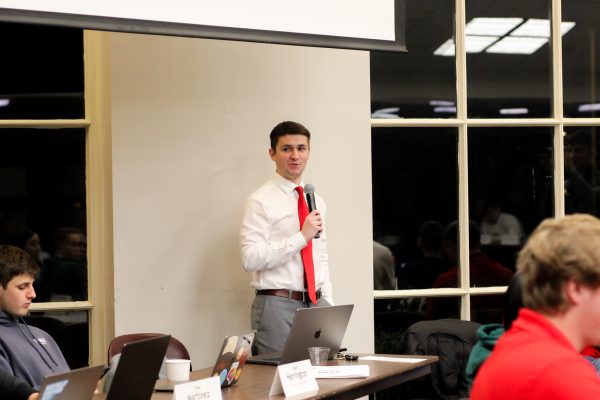
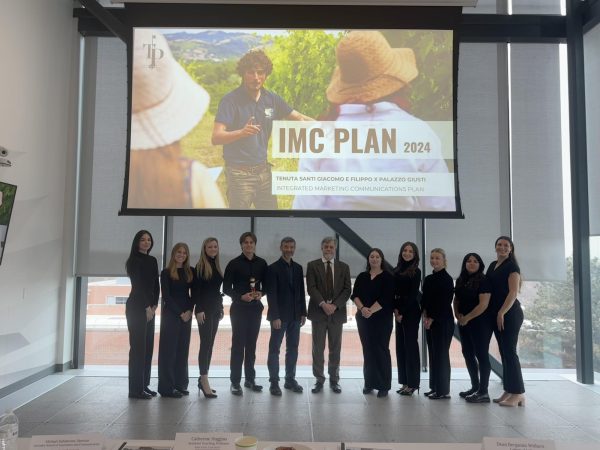
Fran Amin | Nov 28, 2022 at 9:00 pm
More than 150 universities across the US, Canada and Europe will hold rallies in support of protesters in Iran this Wednesday 30 November.
I am wondering if Iowa State University is taking part in this rally. If yes, location and time. If no, why not.